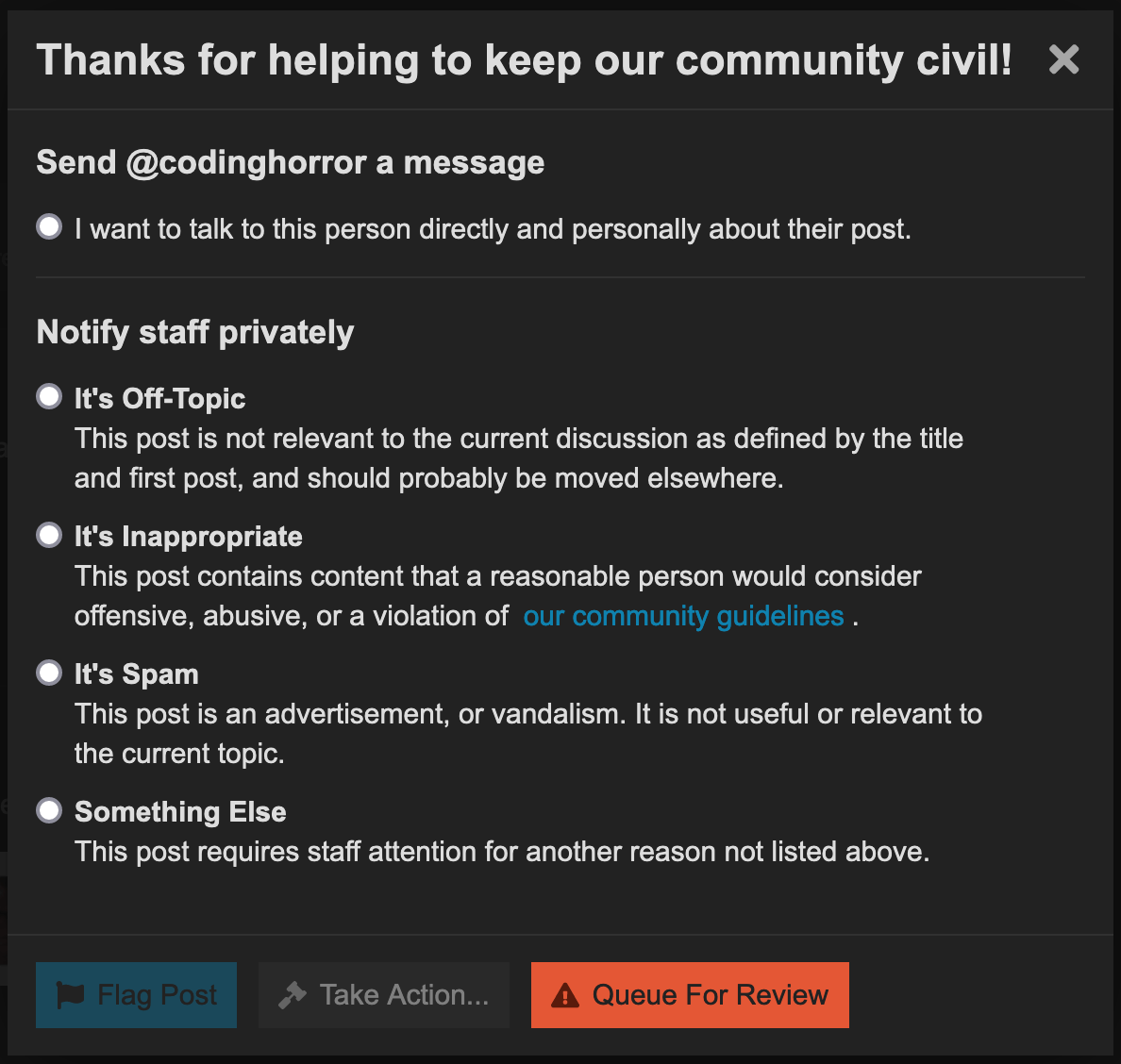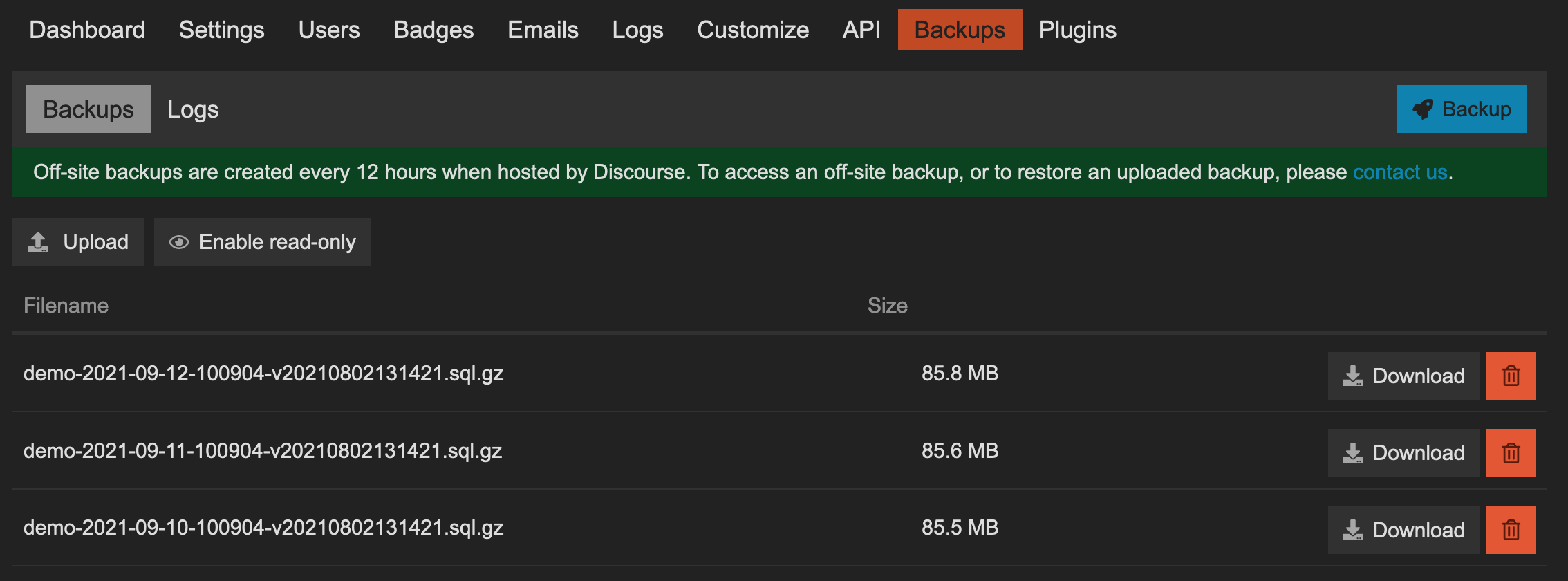Five Essential Features of an Online Community Platform
Choosing the right community platform can be difficult. With the variety of feature sets available, it can be difficult to know what's most important for your community. In this post, we’re going to take a look at what we think are the five most important features to consider when looking for an online platform or starting a new community.
To summarize, they are:
Let’s dive in!
Signup
Ever been through a signup process that involved giving more information than you wanted (credit card info, birthday, location, you name it), multiple trips to your email inbox, and extreme amounts of frustration? A complicated signup process is no fun for anyone and can drastically decrease the number of users signing up. For a community, you want your users to be able to read, sign up, and start posting with as few steps as possible.

A great signup flow might look like this:
- Click
Sign Up - Enter your info (email, username, password)
- Confirm your account via email
- You’re done!
The fewer the steps, the easier it is for new members to contribute to the conversation and keep your community growing.
There is a caveat to this though: the easier you make joining the community, the more vulnerable it is to spammers. Many platforms use CAPTCHAs and email confirmation to try to ward off bot spammers with decent success. In recent years, however, there has been an uptick in the number of human spammers, meaning the tools meant to stop bots (but allow humans) are no longer effective.
Discourse takes a different approach with a built-in trust level system. These trust levels restrict access to features spammers love (posting links, images) for all new users until they’ve built up trust by interacting with the community in healthy ways while enabling the signup process to stay simple and low friction.
Search
The beauty of an online community is the ability to jump into conversations at any point and see the history of what’s already been discussed. When a conversation has taken place recently, it’s relatively low effort to chime in with your own thoughts. But what if the discussion happened months -- or even years -- ago? This is where search comes in.
Search enables community members to:
- find relevant discussions and answers
- located anywhere in your community
- from any time they were created.
On meta.discourse.org, we have discussions ranging from early 2013 to now, and anyone can add their voice to these topics. However, without powerful search, it would be nearly impossible to find these older discussions to keep them updated and relevant.

A high-quality search feature has these characteristics:
- Accessibility from anywhere in the community: Who wants to completely leave their post in progress just to find a link to a relevant topic? Search should keep you in the context of what you’re currently doing, at least to start.
- Fast: If a search takes longer than an instant to return results, people won’t use it.
- Accurate: There’s nothing more frustrating than putting together an exact search query and getting unexpected, inaccurate results.
- Advanced query capabilities: Your community’s power users will appreciate the ability to narrow down results with a variety of filters to more easily find what they’re looking for.
Moderation
Public communities are often plagued with trolls and spam. If toxic content goes undealt with, your members are the ones who deal with the consequences. This is why high quality moderation tools are essential to any community platform.
Moderation features allow a set of users (called, wait for it... moderators) to act on behalf of the community in order to keep the quality of discussion high. Most often, moderators can edit and delete posts seen to be violating the community’s guidelines.
It’s one thing for an admin or moderator to be able to delete or edit posts when your community is small, but how does that scale when your forum has thousands of users? This is where moderation tools can go to the next level -- community-led moderation. Instead of solely relying on staff to find, review and handle suspect posts, users can report offending content to a team of moderators who can then choose the appropriate course of action.

Some platforms have a basic implementation of community moderation where a flagged post can either be deleted or restored. Other tools, like Discourse, have implemented a review queue, where posts flagged by the community (or by a service like Akismet) are queued and prioritized for easy discussion and action.
Analytics
How do you know if your community is growing or if it’s healthy? Analytics are one way to measure both of these critical aspects, at least in some regard. Nearly every website uses tools like Google Analytics to see how many visitors the site gets, what they’re doing, and where they are coming from. This is a great starting point for overall metrics, but to truly understand what’s going on in your community, you need deeper analytics designed for that purpose.

Quality community analytics can show if your group is growing or shrinking, what people are engaging the most (so you can nurture your relationships with them), and what kind of stickiness your community has (so you know if users have a tendency to visit again or drop off). Discourse itself has reporting capabilities designed by community managers with decades of industry experience built right in. Right in the software you have access to the metrics you need to determine the best course of action to manage your community.
Data Ownership
Let’s be honest -- stuff happens. Companies change ownership. Communities shut down only to start up again some time later. Software comes and goes. It can be terrifying to trust your data to a company that keeps it locked behind extremely high fees or makes you jump through hoops to get access. This is your community -- you’ve invested the time, money, and effort into building it, why should you have to do work to get your data?

In light of this reality, a critical feature of any community software is data ownership – where you own the data, meaning you can get access to it at any time, no questions asked. With Discourse, you can grab a full backup of your community whenever you want. Not only that, but you’re free to move your Discourse site wherever you like, whether that’s on to a self-hosted instance or hosted with us.
This kind of flexibility and ownership is essential for community managers. If your current platform or community effort doesn’t work out, you want the ability to move somewhere that has the features you need. If you're ready to get started in building a new community, check out a simple strategy to get going.
